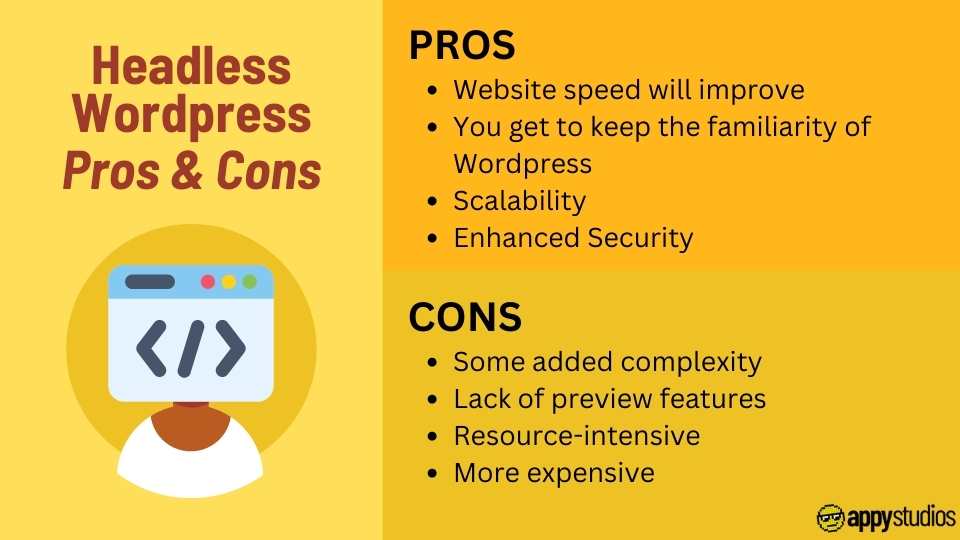
Headless Websites Are A Thing. Here’s Why
Websites have evolved a lot over the years, although some might argue they haven’t. We in fact, ourselves, argued they haven’t in this article about websites needing more animation to go beyond being a simple brochure. However, it’s true they have evolved plenty beyond the Yahoo and Myspace days.
In recent years, the world of web development has witnessed a significant shift towards decoupled architectures and headless content management systems (CMS). This has been a significant improvement that has made websites safer, and faster.
One popular option leading the way is Headless WordPress, an approach that separates the frontend and backend of a website, offering unparalleled flexibility and improved performance. Headless WordPress has been growing rapidly over the past few years and its growth is predicted to continue. This report predicts it will be growing 22% year on year until 2032.
In this article, we’ll delve into the rise of Headless WordPress as a hosting option for company websites, highlighting its benefits and providing evidence to support its growing popularity, in case this has come up on your radar of hosting options.
What is Headless WordPress?
Traditionally, WordPress has been known as a monolithic CMS, handling both content management and frontend presentation. However, with the emergence of decoupled architectures, developers have recognised the limitations of this approach. Headless WordPress, also known as “API-driven” or “Decoupled WordPress” or4 even “static WordPress,” separates the CMS backend from the frontend, allowing developers to utilise modern technologies to build interactive and dynamic user interfaces.
What does this actually mean for a WordPress user? It means no longer logging into your website via the default ‘/wp-admin/’ page. This has always been a vulnerability in WordPress websites. It’s not exactly the smartest thing to do to have your website admin page accessible to all and sundry on the internet (at Appy Studios, we had always added an additional password requirement to access to that page, prior to moving to headless websites).
Headless WordPress Pros & Cons
Every solution has its pros and cons, and Headless WordPress is no different. We have listed some of them in this image.

Benefits of Headless WordPress
Let’s take a greater look at some of the benefits.
- Enhanced Performance … SPEED: By eliminating the coupling between backend and frontend, Headless WordPress minimises unnecessary bloat and optimises website performance. With reduced page load times, businesses can provide seamless user experiences, leading to higher conversion rates and improved search engine rankings. One of our clients, Buffetmap, increased their website speed score to 95% (top 5% amongst all websites) by making this change and other fixes we were able to apply.
- Greater Design Flexibility: With a decoupled architecture, developers are no longer bound by the limitations of WordPress themes. They can leverage modern front-end frameworks like React, Angular, or Vue.js to create fully custom and visually stunning interfaces that align with their brand identity.
- Improved Scalability: Headless WordPress allows for horizontal scaling, enabling businesses to handle increased website traffic and accommodate growing user bases. By separating the CMS and frontend layers, enterprises can easily scale their infrastructure to handle heavy loads without affecting content management or sacrificing user experience.
- Seamless Content Delivery: Headless WordPress provides a centralised content management system, enabling companies to streamline content creation and distribution. Content can be effortlessly delivered across multiple channels, including websites, mobile applications, IoT devices, and even emerging technologies like voice assistants.
- Simplified Maintenance and Updates: Decoupled architecture allows for independent updates to the frontend and backend, reducing the risk of breaking the website during CMS updates. Businesses can maintain and enhance the frontend separately, ensuring a smooth user experience while keeping the CMS secure and up to date.
So is Headless WordPress Worth It?
If your website is currently sitting on regular WordPress (approximately 28% of the internet is, according to Built With), then it is absolutely worth you considering a change to a Headless website. It may struggle with more dynamic websites, but it is perfectly suitable for small to medium sized sites.
As the digital landscape evolves, website owners need solutions that offer flexibility, performance, and scalability. Headless WordPress has emerged as a strong option for corporate website hosting, empowering developers to create cutting-edge user experiences while still leveraging that robust and familiar content management capabilities that WordPress offers. With enhanced performance, design flexibility, scalability, and streamlined content delivery, Headless WordPress is poised to continue its rise as a preferred choice for businesses looking to unlock the full potential of their websites in the era of modern web development.
If you’re looking for a WordPress website developer who knows their way around Headless WordPress, feel free to get in touch with us here at Appy Studios.
